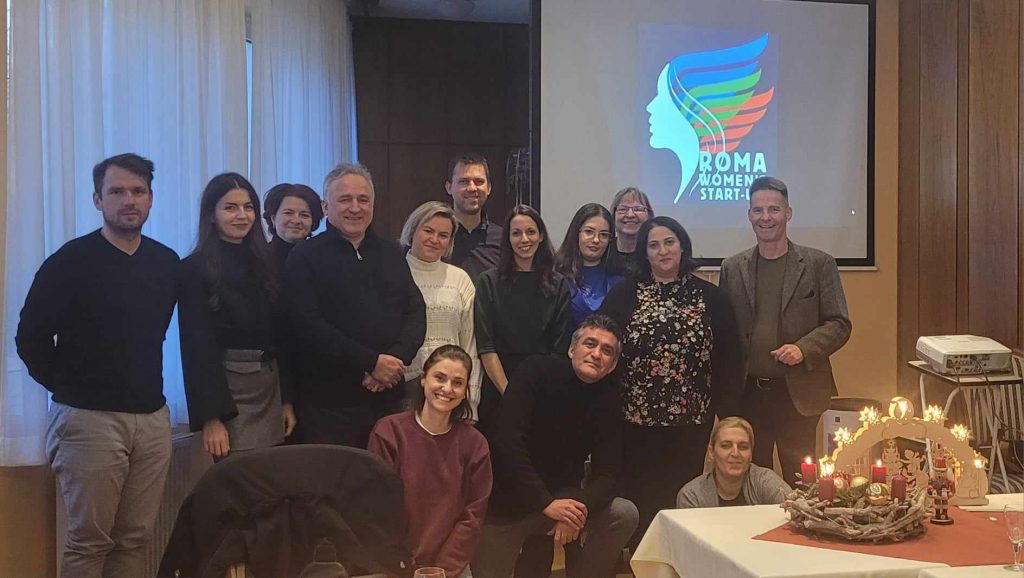Roma Women’s Start-Up: self employment for emancipation and social integration
“… They steal like ravens, are unwilling to work and a nation of restless nomads…” – when it comes to Roma, we are quick with prejudices. Far more serious, however, is the fact that they can be mobilised at any time, which is sadly demonstrated not only by regular riots against them, but also by their actual living conditions. Roma are still the poorest, most affected by unemployment, the least educated, the shortest living and the most arrested Europeans!
„Roma need real education opportunities.“ This quote of Ciprian Necula, head of the Roma Education Fund in Romania, is true and bitter at the same time because it expresses that in this context, only a rare progress can be detected since the enforcement of the New Strategic Framework for the Roma in the end of 2020.
In the partner countries of the project in which officially about 6.5 million Roma live (out of them 500.000 in Slovakia, 120.000 in Germany, 310.000 in France, 175.000 in Greece, 600.000 in Hungary, 185,000 in North Macedonia, 1,95 million in Romania and 2,7 million in Turkey) (Statista 2024) the situation is as follows:
After compulsory schooling, Roma participation in education declines significantly. Only about 15 per cent complete secondary school. Less than 20 per cent of Roma have completed vocational training. Only 2 to 5 per cent of all Roma attend high school. Less than 5 per cent of all Roma are university graduates. This is not least because Roma are completely underrepresented in educational professions compared to their share of the population.
The situation of the Roma in the area of self-employment is even more dramatic – although largely ignored by the public. Across the EU, around 15 per cent of all employed people are self-employed (solo self-employed and self-employed with employees).
The proportion of Roma among registered self-employed people in the partner countries – except for Greece – is so low that it is not recorded statistically. Experts estimate that it is less than 1 per cent.
However, more and more people with a migrant background are choosing to become self-employed. The proportion of self-employed people in this group has increased in recent years – despite multiple crises. In Germany, for example, one in five people with a migrant background is now starting their own business.

This shows that the way into self-employment is a serious alternative to unemployment and contributes therefore relevantly to combating poverty and social exclusion, to lifelong learning and to social participation. With the project we wish to finally pave this way for Roma women as well.
Project Objectives
It is the objective of „Roma Women’s Start-up“ that more and more Roma women go the way into self-employment in a self-determined way and accordingly qualified, so that they can:
- Contribute to the family income with their own, legal, and appreciated work
- Strengthen their independence and their freedom of decision
- Break the still prevailing family image and role perception step by step
- Create role models for coming generations and
- Promote their social integration.
Expected Results
- Curriculum and training material for the implementation of an entrepreneurship course for Roma women in all partner languages and English
- Recognition of this course by the responsible institutions in the partner countries
- Self-Evaluation-Tool for potential female founders
- Curriculum and training material for the education of trainers for the implementation of the entrepreneurship course in all partner languages and English
- Recognition of the education of trainers as adult education measure by the Institute of Adult Education at the University of Szeged
- 16 trainers who were educated and certified on this basis
- 70 adult Roma women who successfully took part in the entrepreneurship course in the partner countries in the frame of the testing and who have – in the ideal case – founded their own start-up
- Online Platform for female Roma founders
- Handbook for female founders
- Dissemination and exploitation of the project results
Funded by the European Union. Views and opinions expressed are however those of the author(s) only and do not necessarily reflect those of the European Union or the European Education and Culture Executive Agency (EACEA). Neither the European Union nor EACEA can be held responsible for them.
